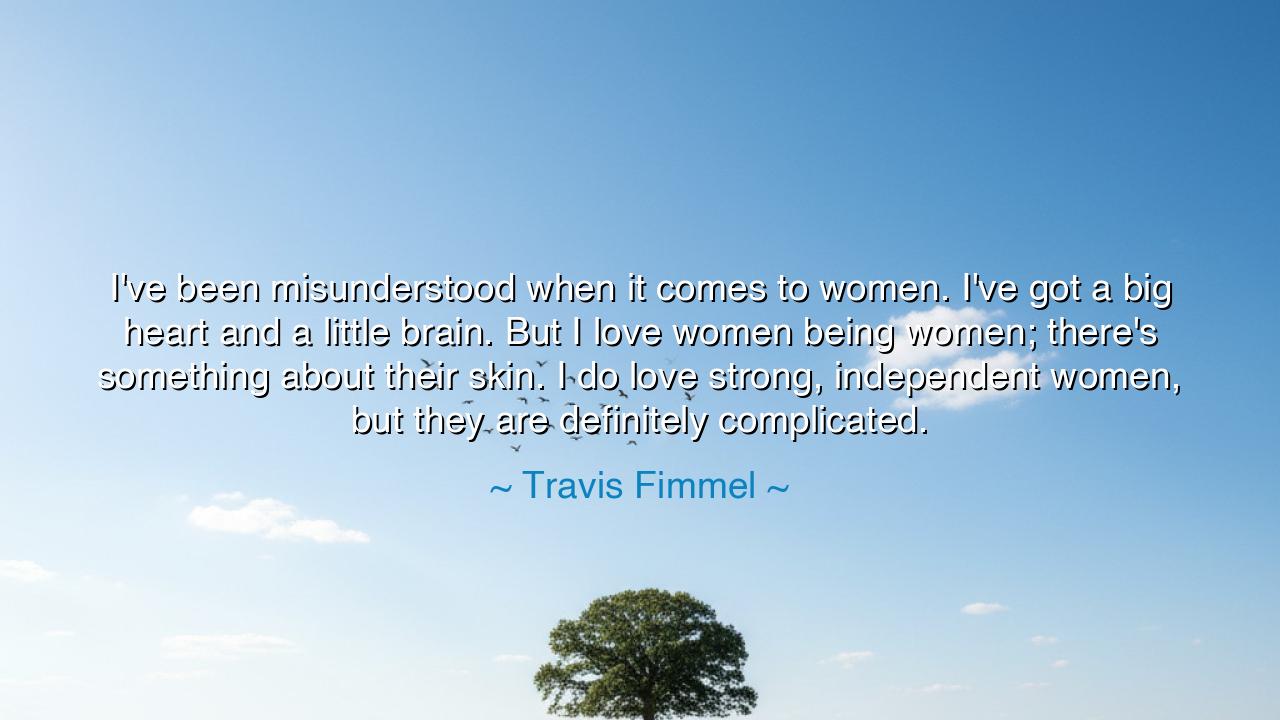
I've been misunderstood when it comes to women. I've got a big
I've been misunderstood when it comes to women. I've got a big heart and a little brain. But I love women being women; there's something about their skin. I do love strong, independent women, but they are definitely complicated.






The words of Travis Fimmel — “I’ve been misunderstood when it comes to women. I’ve got a big heart and a little brain. But I love women being women; there’s something about their skin. I do love strong, independent women, but they are definitely complicated.” — carry the disarming candor of a man who admits both his limits and his longings. They reveal the timeless dance between the masculine and the feminine: a bond woven with tenderness, bewilderment, and awe.
To say he has a big heart but a little brain is not mere self-mockery. It is the confession that love often disarms reason. The mind, with all its logic, falters before the mystery of the opposite sex, while the heart rushes headlong into devotion. The ancients often wrote of this very truth: how the mightiest of men could be unraveled by the glance of a woman, their reason cast aside in favor of longing. For love is not a matter of calculation, but of surrender.
The reverence for women being women — their presence, their beauty, even their skin — speaks to the primal wonder that has always stirred the hearts of men. Yet Fimmel does not end there; he confesses admiration for strong, independent women, those who defy simple roles and command respect in their own right. Such women, he admits, are complicated, but it is in their complexity that their strength and allure truly dwell. Here lies a truth as old as time: the feminine is not a puzzle to be solved but a mystery to be honored.
History itself bears witness. Consider Antony and Cleopatra: the Roman general, powerful in war, yet powerless before the Egyptian queen. Cleopatra’s strength, intelligence, and independence made her both irresistible and dangerous. Antony’s downfall is often told as a tale of weakness, but it is also proof that the complicated nature of a strong woman can shape empires and alter destinies. Such examples show that the mystery Fimmel speaks of is not trivial, but deeply woven into the fabric of human history.
Let the generations remember: love is not simple, nor are the souls of men and women who partake in it. To honor the complicated nature of another is to accept the truth of their humanity. Fimmel’s words, though offered with humor, carry a wisdom born of humility: that men may stumble in understanding, but if their hearts remain open, they will find beauty even in what they cannot fully comprehend. Thus we are taught that the strength of love lies not in conquering mystery, but in embracing it.






YHYen Hai
It’s interesting to hear Travis Fimmel talk about his views on women, but I’m curious about how his perception of women being 'complicated' plays into larger societal views. Do you think complexity in people, especially women, is often seen as a negative trait, or is it more about how we understand and embrace that complexity?
C7Le Nguyen Bang Chau 7B
I get that Fimmel is trying to express his admiration for women’s strength and independence, but the statement about their 'complicated' nature feels a bit dismissive. It makes me wonder, is it possible to acknowledge complexity in a way that doesn’t come across as patronizing or oversimplified?
JKJulie Kim
The comment about women being 'complicated' and having 'skin' seems to objectify them a bit. Sure, appreciating someone’s presence and strength is one thing, but reducing them to their physical traits feels off. What are your thoughts on the balance between appreciating a person and reducing them to their looks or gender characteristics?
VNDinh Vu Nguyen
This quote feels a bit conflicting. On one hand, it seems like Travis Fimmel is acknowledging his admiration for women and their complexity, but on the other hand, the comment about 'little brain' feels like it simplifies the conversation in a way that doesn’t do justice to women’s intelligence or capabilities. Why do you think some people struggle to express admiration without reducing it to stereotypes?